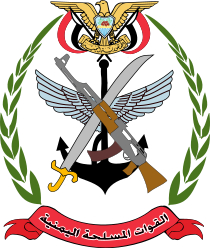Yemen Portal
 |
Yemen (/ˈjɛmən/ ; Arabic: ٱلْيَمَنْ, romanized: al-Yaman), officially the Republic of Yemen, is a sovereign state in West Asia. Located in the southern Arabian Peninsula, it borders Saudi Arabia to the north, Oman to the northeast, and the Indian Ocean to the south, sharing maritime borders with Eritrea, Djibouti and Somalia across the Horn of Africa. Covering roughly 528,000 square kilometres (203,861 square miles), with a coastline of approximately 2,000 kilometres (1,200 miles), Yemen is the second largest country on the Arabian Peninsula. Sanaa is its constitutional capital and largest city. Yemen's estimated population is 34.7 million, comprised mostly of Arab Muslims. It is a member of the Arab League, the United Nations, the Non-Aligned Movement and the Organisation of Islamic Cooperation.
Owing to its geographic location, Yemen has been at the crossroads of many civilisations for over 7,000 years. In 1200 BCE, the Sabaeans formed a thriving commercial kingdom that included parts of modern Ethiopia and Eritrea. In 275 CE, it was succeeded by the Himyarite Kingdom, which spanned much of Yemen's present-day territory and was heavily influenced by Judaism. Christianity arrived in the fourth century, followed by the rapid spread of Islam in the seventh century. Yemenite troops playing a crucial role in early Islamic conquests. Various dynasties emerged between the 9th and 16th centuries. During the 19th century, the country was divided between the Ottoman and British empires. After World War I, the Mutawakkilite Kingdom of Yemen was established, which in 1962 became the Yemen Arab Republic (North Yemen) following a coup. In 1967, the British Aden Protectorate became the independent People's Democratic Republic of Yemen (South Yemen), the first and only officially socialist state in the Arab world. In 1990, the two Yemeni states united to form the modern Republic of Yemen (al-Jumhūrīyah al-Yamanīyah), with Ali Abdullah Saleh serving as the first president until his resignation in 2012 in the wake of the Arab Spring.
Since 2011, Yemen has been enduring a political crisis, marked by street protests against poverty, unemployment, corruption, and President Saleh's plan to amend Yemen's constitution and eliminate the presidential term limit. By 2015, the country became engulfed by an ongoing civil war with multiple entities vying for governance, including the Presidential Leadership Council of the internationally recognized government, the Houthi movement's Supreme Political Council, and the separatist Southern Movement's Southern Transitional Council. This conflict, which has escalated to involve various foreign powers, has led to a severe humanitarian crisis. (Full article...) User:Ahmedaliyemen/sandbox/box-footer
This is the show new selections clickable link
The Yemeni Armed Forces (Arabic: الْقُوَّاتُ الْمُسَلَّحَةُ الْيَّمَّنِيَّة, romanized: Al-Quwwat Al-Musallahah Al-Yamaniyah) are the military forces of the Republic of Yemen. They include the Yemeni Army (including the Republican Guard), Yemeni Navy (including the Marines) and the Yemeni Air Force (including the Air Defense Force). The capital of the country, Sana’a is where the military is headquartered. Per the constitution of Yemen, the President of Yemen serves as the commander-in-chief.
The supreme commander of the armed forces is disputed between Rashad al-Alimi, Chairman of the internationally recognized Presidential Leadership Council, and Mahdi al-Mashat, the chairman of the Supreme Political Council. (Full article...)List of selected articles
|
|---|
Selected article -
Selected article -

The House of Representatives (Majlis al-Nuwaab) is the lower house of the Parliament of Yemen. It shares the legislative power with the Shura Council, the upper house. The Assembly of Representatives has 301 members, elected for a six-year term in single-seat constituencies. It is one of the rare parliamentary chambers in the world to currently have no female representation.
The House of Representatives was established in 1990 after the unification of Yemen for a transitional period. An election hasn't been held for the body since 2003. An election was set for 27 April 2009, but president Saleh postponed it by two years on 24 February 2009. However, the election did not take place on 27 April 2011, and was again postponed until the next presidential election, sometime in February 2014.
In January 2014, the final session of the National Dialogue Conference (NDC) announced that both elections had been delayed, and would occur within 9 months of a referendum on a new constitution which had yet to be drafted. However both the GPC and Houthi representatives on the National Authority for Monitoring the Implementation of NDC Outcomes have refused to vote on the new constitution drafted by the constitution drafting committee, which submitted it in January 2015. (Full article...)Featured biography
The page "User:Ahmedaliyemen/sandbox/Featured biography/9" does not exist.
General images -
Did you know...
Related portals
User:Ahmedaliyemen/sandbox/Related portals










